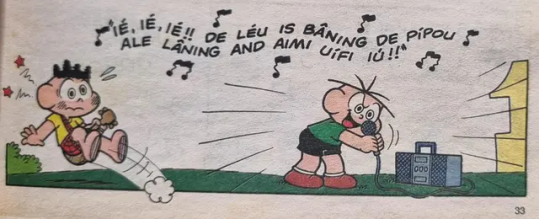Text
A Portrait of Oral Fixation

She sits at her desk to start the day.
As she sorts through her pending tasks, she automatically reaches for a lollipop stick in the corner of her workspace.
The candy was eaten long ago, and the white plastic tube has teeth marks all around it, evidence of her chewing through the pressure of deadlines, colleagues and expectations.
She only notices the resumed plastic munching when the stick breaks in her mouth while she toils with a challenging problem.
She sighs opening her drawer and pulling a still-wrapped lollipop.
If she's going crazy, she might as well indulge in some sugar.
<><><><><><>
In his psychoanalysis theory, Sigmund Freud stipulates that stimuli at a child's mouth (as in during breastfeeding or sucking pacifiers) and the anxieties related to them will influence their behaviour as a grown-up.
The adult, according to theory, might engage in habits such as excessive talking, eating, or drinking -- all of them related to mouth stimulation. Chewing, smoking and even fellatio are also commonly cited as possible addictions.
Click here to know more.
0 notes
Text

Little Onion, my spirit animal.
When the mood calls for angry German musik.
6 notes
·
View notes
Text
On Reading Harry Potter Fanfiction
I’ve been reading a lot of Harry Potter fanfiction, specifically “canon-compliant post-war fanfiction”.
Anyone who knows me shouldn’t be surprised, as I have consumed J.K. Rowling’s series since childhood, and fanfiction is how people who share my hobby of writing explore and expand the original universe.
I’ve dived into this kind of content before. Back in 2009, after finishing Harry Potter and the Deathly Hallows, I felt lucky to find authors across many independent archives (websites dedicated to hosting fanfiction) who were willing to fill in the gaps left by J.K. Rowling, especially those in the 19 years between the Battle of Hogwarts and the Epilogue.
Coming back now, 15 years later, it is fascinating to notice how both myself and the fanfiction community have evolved: I’m no longer a teenager, so my interests revolve around a broader repertoire (of fiction, sure, but of life experiences as well) and now I have a better eye for writing technique and aesthetics; the community is better structured, with well-established archives centralising stories that no longer simply fill the gaps left in the books, but have organically formed a new canon for the universe and its characters.
This evolution of readers and writers is, in many ways, comparable to how novels have driven changes in cultural perception since the 18th century.
An example of this cultural shift, as I perceive it, is notable when considering the copyright disclaimers added by authors at the beginning of their stories.
“Disclaimer: Only JK Rowling owns Harry Potter. I am not JK Rowling. Therefore, I do not own Harry Potter.” Author White_Squirrel in Chapter 2 of The Arithmancer
From a functional standpoint, adding the disclaimer is undoubtedly the safest legal practice. However, considering how concepts and ideas are formed and shared through cultural means, any attempt to attribute “ownership of Harry Potter” to any individual is pointless.
Yes, J.K. Rowling might receive all the money earned from exploiting Harry Potter and the rest of the Wizarding World. Still, culturally, if we take ideas and behaviour as currency instead of pounds and dollars, many fanfiction stories today owe their existence to other fanfiction authors, not the original Harry Potter books.
Moreover, the groundwork canon of these stories does not revolve around events from the original saga but around Fred’s funeral, Harry and Ginny’s reunion after the war, Hermione’s trip to Australia, the Death Eater trials, etc. — all of these scenes that J.K. Rowling never wrote, but that were covered extensively by fanfiction authors.
It’s clear how much recent stories are supported by others published in fanfiction archives over the years, more so than the original books J.K Rowling legally “owns”. The following are examples of how this shift in influence affects my experience of these stories when reading with attention to technique and emotional delivery, focusing on canon-compliant content.
In Beasts (ongoing since December 2023), author @whinlatter does not write the summer after the battle, skipping to Ginny’s seventh year at Hogwarts. Her powerful emotional delivery of the psychological challenges affecting the characters’ lives and relationships in the post-war period is excellent despite the untold chunk of the narrative.
The author supports this choice with flashbacks to missing moments from the original books. Still, I had further support from the affective memories from reading Grave Days, which author Northumbrian completed in 2010. It depicts the funerals and reunions of that summer, and the emotion from these scenes enhances the impact of reading the more recent tale by whinlatter.
Similarly, Knowing Where To Look (finished in 2024) starts immediately after the battle but is told from the point of view of an original character (Gawain Robards). Author ala_baguette indirectly tells the reader about Harry’s development with the other main characters through his late-night conversations with Robards at the edge of the story's main plot.
The result is remarkably engaging, but it would not have the same effect if I hadn’t previously read Ginny slapping some sense into a similarly sulky and reticent Harry in The First Day by author little0bird, completed in 2010 before J.K Rowling even published the canonical pairings for all characters (I never imagined George/Katie, a non-canon pair, could be as good as in this story).
In 2024, fanfiction is already self-referential, both in its conceptual and emotional aspects. It no longer depends too much on the original universe written by J.K. Rowling to thrive. The community participants define the collection of ideas and behaviour around the stories and characters despite not owning the trademarks.
In other words, fuck J.K. Rowling, her money, and her bigoted opinions; all hail the independent authors who renew and refresh the wizarding world and those who culturally inhabit it.
12 notes
·
View notes